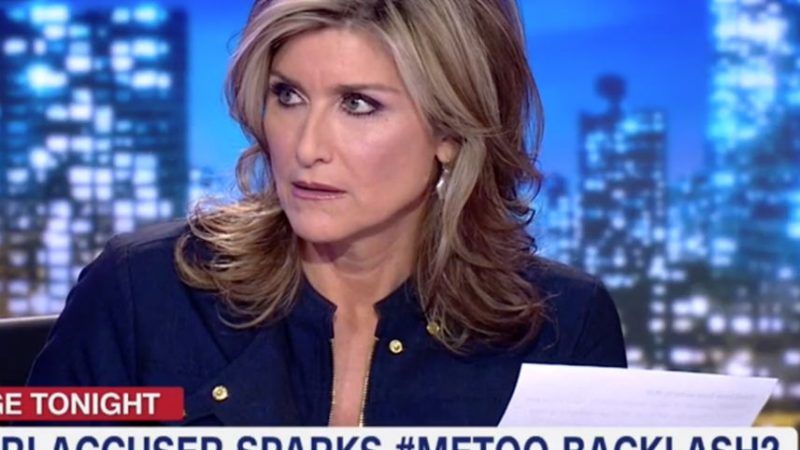The Gen X vs. Millennials War Over #MeToo
Ashleigh Banfield's fight with babe reporter Katie Way is the latest manifestation of an interesting generational divide.

On Wednesday, in case you missed it, Headline News anchor Ashleigh Banfield, who had previously been critical of the decision by a website called babe to publish the anonymous and graphic tale of a young woman's disquieting sexual experience with comedian Aziz Ansari, read and responded to a pissy and insulting email she received from babe reporter Katie Way:
Way's note is like a parody of everything you hate about young Millennials and/or Generation Z. Sample:
I hope the ~500 RTs on the single news write-up made that burgundy lipstick bad highlights second-wave feminist has-been feel really relevant for a little while. She DISGUSTS me, and I hope when she has more distance from the moment she has enough of a conscience left to feel remotely ashamed — doubt it, but still….I would NEVER go on your network. I would never even watch your network. No woman my age would ever watch your network. I will remember this for the rest of my career — I'm 22 and so far, not too shabby! And I will laugh the day you fold.
Banfield, being my age, is nobody's second-wave feminist, but fact-checking such sub-Trumpian blurtage feels like arm-wrestling a toddler, so let's make a broader observation: This is hardly the only generational spat within the #MeToo conversation.
Take the Caitlin Flanagan rebuke to babe in The Atlantic. The piece begins with this confession:
Sexual mores in the West have changed so rapidly over the past 100 years that by the time you reach 50, intimate accounts of commonplace sexual events of the young seem like science fiction: You understand the vocabulary and the sentence structure, but all of the events take place in outer space. You're just too old.
Or the "schism" within The New York Times over what to do about the clumsy or unforgivably line-crossing (depending on your point of view) romantic fumblings by political reporter Glenn Thrush, as reported by Vanity Fair:
On one side, according to newsroom sources, there is a cohort of young, millennial, New York-based employees for whom the event has been particularly upsetting. These employees, these sources note, are generationally hyper-attuned to issues related to race, gender, and newsroom diversity, which they often discuss on the Times's internal Slack app. For some within this cohort, there's a sentiment that the Times should set an example amid our cultural awakening—that it would be hard to keep Thrush employed while continuing to lead the charge in covering the reckoning that has entangled him.
Things are different in the Washington bureau.
Gen Xer and spouse-of-Reason-person Megan McArdle wrote this week about the #MeToo generational divide, stressing the older cohort's main complaint: The notion of agency:
I have now had dozens of conversations about #MeToo with women my age or older, all of which are some variant on "What the hey?" It's not that we're opposed to #MeToo; we are overjoyed to see slime like Harvey Weinstein flushed out of the woodwork, and the studio system. But we see sharp distinctions between Weinstein and guys who press aggressively -- embarrassingly, adulterously -- for sex. To women in their 20s, it seems that distinction is invisible, and the social punishments demanded for the latter are scarcely less than those meted out for forcible rape.
There's something else we notice, something that seems deeply connected to these demands for justice: These women express a feeling of overwhelming powerlessness, even though they are not being threatened, either physically or economically. How has the most empowered generation of women in all of human history come to feel less control over their bodies than their grandmothers did?
As ever during generational battles, the most interesting voices are often the ones pitched in between—so at Reason, Elizabeth Nolan Brown; at The Daily Beast, Erin Gloria Ryan (these thirtysomethings and their three names!). I interviewed the latter yesterday on Sirius XM, and she made an intriguing age-based sex claim: Basically, dudes born after 1987 expect their sex lives to imitate porn; the older ones not so much. Millennial gals walk into situations expecting empowerment, and instead get the equivalent of perpetually adolescent boys.
I don't know how true any of that is, though I will say that before I closed out of the gross babe essay about halfway through, I recognized in Asnari's reported behavior something similar to how divorced Gen X friends of mine describe wading back into the dating pool after a decade-plus away—it can be, especially when enabled through dating/hookup apps, almost shockingly transactional, mechanical, contractual.
Then again, by the time you approach 50, intimate accounts of routine sexytime seem like science fiction….


Show Comments (184)